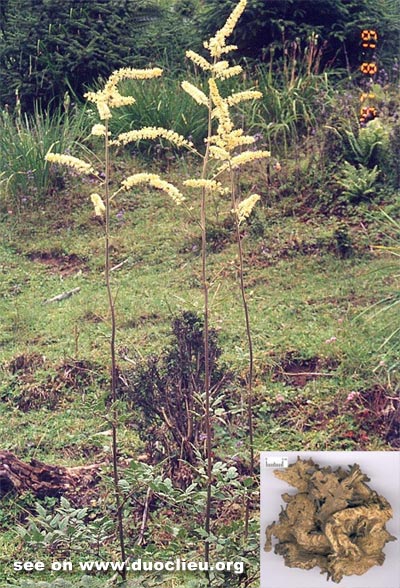Cimicifuga rhizome (Shengma)


Botanical Name: 1. Cimicifuga foetida L.; 2. Cimicifuga dahurica (Turcz) Maxim.; 3. Cimicifuga heracleifolia Kom.
Common Name: Cimicifuga rhizome, Bugbane rhizome
Source of Earliest Record: Shennong Bencao Jing
Part Used & Method for Pharmaceutical Preparations: The roots, or rhizomes, are dug in summer or autumn and dried in the sun. After removing the fibrous roots, they are soaked in water and cut into pieces.
Properties & Taste: Pungent, sweet and slightly cold.
Meridians: Spleen, lung, large intestine and stomach
Functions: 1. To release the exterior and bring measle rash to the surface; 2. To clear heat and toxins; 3. To raise the yang-qi
Indications & Combinations:
1. Early stage of measles with incomplete expression of the rash. Cimicifuga rhizome (Shengma) is used with Pueraria root (Gegen) in the formula Shengma Gegen Tang.
2. Excessive heat in the stomach meridian manifested as headache, swelling of gums, painful gums, painful teeth and ulceration of tongue and mouth. Cimicifuga rhizome (Shengma) is used with Coptis root (Huanglian), Fresh rehmannia root (Shengdihuang), Gypsum (Shigao) and Moutan bark (Mudanpi) in the formula Qingwei San.
3. Sore throat caused by invasion of exogenous wind and heat. Cimicifuga rhizome (Shengma) is used with Scrophularia (Xuanshen), Platycodon root (Jiegeng), Arctium fruit (Niubangzi) in the formula Niubang Tang.
4. Sinking of qi in the spleen and stomach manifested as chronic diarrhea, prolapse of rectum, uterine prolapse and gastroptosis. Cimicifuga rhizome (Shengma) is used with Ginseng (Renshen), Scutellaria root (Huangqin) and White atractylodes (Baizhu) in the formula Buzhong Yiqi Tang.
5. Boils, carbuncles, furuncles and skin disease. Cimicifuga rhizome (Shengma) is used with Dandelion herb (Pugongying), Honeysuckle flower (Jinyinhua), Forsythia fruit (Lianqiao) and Red peony (Chishao).
Dosage: 3-10 g.
Cautions & Contraindications: This herb is contraindicated in patients who have difficulty breathing, who have measles with complete rashes, or who have deficient yin syndrome with heat.

